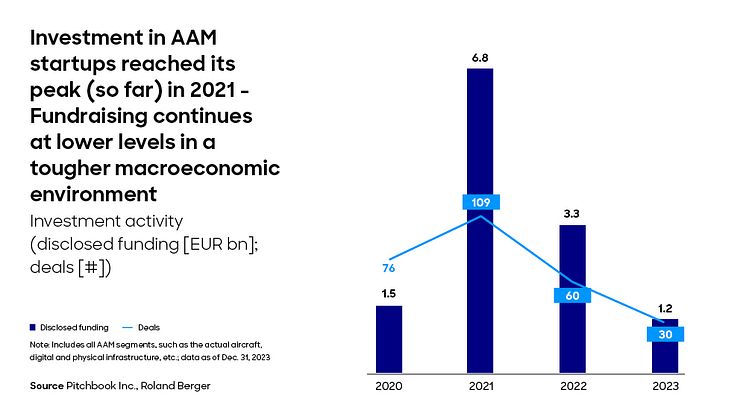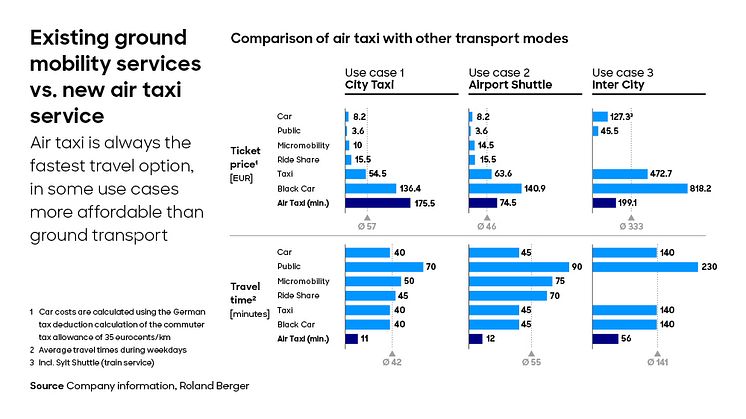
Press release -
Air Taxi services profitable only in the premium market initially - Efficiency across the whole ecosystem essential
- Roland Berger study: Air taxis may be able to compete on price with regular taxi, black car livery, or helicopter services, depending on the use case and cost factors
- Investments in Advanced Air Mobility have fallen sharply: After record fundraising of EUR 6.8 billion in 2021, only EUR 1.2 billion invested in 2023
- A compelling business model is key for raising new capital, and all ecosystem stakeholders must work together to bring costs down
Munich, August 2024: Advanced Air Mobility (AAM) services will only be economically viable in a premium niche market, at least in the early years. This is one of the findings of a study conducted by experts from Roland Berger and the German Aerospace Center (DLR) focusing on the economics of various AAM use cases. The long-term economic success of eVTOL (electric vertical take-off and landing) services depends on whether industry players manage to present a compelling business model. And in order to mitigate costs, all stakeholders across the entire AAM ecosystem will need to work together: Only sustainable business models can provide the basis for the further flow of urgently needed investments.
In 2021, a record EUR 6.8 billion was invested in AAM startups. In 2022, the volume of fundraising shrank by around half to EUR 3.3 billion, before falling further to just EUR 1.2 billion in 2023. This was mainly due to factors like the generally difficult macroeconomic situation with rising interest rates. "However, investor reticence also reflects concerns over whether – and when – AAM can even be profitable," said Manfred Hader, Partner at Roland Berger. "Our study investigated exactly that, and we concluded that, although eVTOL services will remain a premium niche market in the early years, they can be commercially viable and profitable in limited use cases and in the right scenarios."
Optimistic forecasts from eVTOL OEMs
As yet, there are no real-life data on the costs of AAM services, because the first commercial flights will not take place before 2025 or 2026. Aircraft OEMs optimistically predict that passengers will pay the same price as an equivalent taxi ride, or even less, for such flights – with shorter travel times and greater convenience. An air taxi service of around 65 kilometers, for example from San Francisco to San José, is expected to cost between EUR 35 and EUR 140, while a flight of 160 kilometers, the distance from New York to Philadelphia, would cost a good EUR 200. To date, these projected numbers have not been scrutinized very much.
For their study, the aviation experts from Roland Berger and the DLR looked into three typical use cases for eVTOL air taxis. In all three cases, the operating costs and thus the ticket prices are determined by the take-off and landing fees at the vertiports as well as the future prices for eVTOL batteries and their service life. The study authors therefore applied different assumptions to calculate each use case. They found that an air taxi flight of 12 kilometers from Hamburg central train station to the Airbus Finkenwerder campus with one passenger would cost between EUR 175 and EUR 350. At around 11 minutes duration, the travel time would be significantly shorter than on the ground, where it would take about40 minutes. With an autonomous flight, a second passenger could fly instead of the pilot, which would halve the cost per ticket.
The second use case, a scheduled airport shuttle over 17 kilometers from the suburb of Blankenese to Hamburg Airport carrying up to four passengers plus carry-on luggage, would cost between EUR 75 and EUR 160 per passenger for a 12-minute flight at a 75% occupancy rate. By comparison, a transfer by ground-based taxi or black car livery service takes 45 minutes and costs between EUR 65 and EUR 140 per vehicle.
The third use case is a scheduled flight from Hamburg Airport to Sylt. This flight, which takes just under an hour and covers around 225 kilometers, would cost between EUR 200 and EUR 300 per passenger in a six-seater air taxi at a 75% occupancy rate, making it slightly cheaper than the existing Sylt Air flight connection with ticket prices ranging between EUR 270 and EUR 320 per person. By land, the journey takes two and a half to four hours and costs between EUR 45 per person for public transport and up to EUR 820 for a black car livery service.
Entire ecosystem crucial for ticket prices and profitability
The study findings reveal that innovative flight services can be economically viable for a premium market, and existing helicopter services demonstrate that the respective target groups are willing to pay for such a service. "However, our analysis also shows that it is not just the aircraft costs that influence profitability but the entire surrounding ecosystem," said Stephan Baur, Partner at Roland Berger. "The long-term success of Advanced Air Mobility depends on demonstrating a clear and convincing business case that proves commercial viability and attracts further necessary funding for industry scale-up. This will require collaboration between eVTOL OEMs, operators, and other AAM stakeholders, like vertiport operators, to enhance the efficiency and effectiveness of all ecosystem building blocks to reduce the unit economics for air taxi services incrementally."
Categories
Roland Berger is one of the world's leading strategy consultancies with a wide-ranging service portfolio for all relevant industries and business functions. Founded in 1967, Roland Berger is headquartered in Munich. Renowned for its expertise in transformation, innovation across all industries and performance improvement, the consultancy has set itself the goal of embedding sustainability in all its projects. Roland Berger revenues stood at more than 1 billion euros in 2023.




